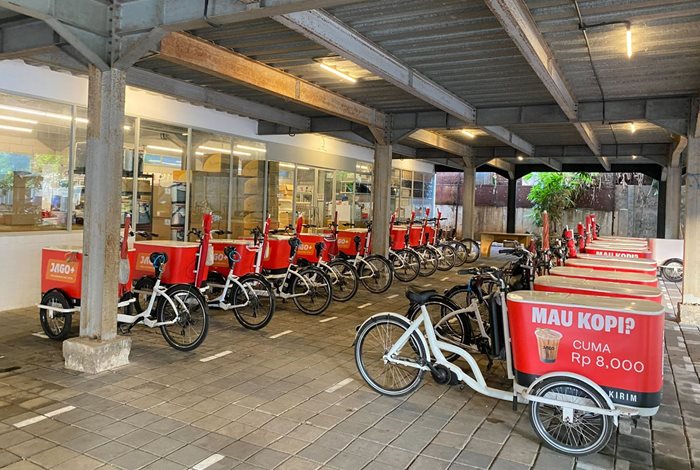Indonesia’s Jago is striving to bring premium coffee to the masses with its affordable mobile café concept. The company’s Co-founder and CEO Yoshua Tanu speaks to World Coffee Portal about the benefits of coffee on wheels, taking on the country’s RTD market and rolling out the brand across the country
.jpg.aspx?lang=en-GB&width=700&height=466)
Jago CEO & Co-founder, Yoshua Tanu
Blending affordable coffee, with app-enabled delivery on a nimble electric coffee cart fleet, Jakarta-based Jago currently operates over 40 ‘mobile cafés’ across the Indonesian capital, connecting its baristas to customers via a mobile app that can deliver pedal-powered coffee within a 40km radius.
Jago closed a $2.2m pre-Series A funding round at the end of 2022 which it will use to expand its electric coffee cart fleet and implement technology upgrades. The company expects to double in size by the first quarter of 2023 and is targeting 1,500 mobile cafés by the end of 2024.
Jago Co-Founder and CEO Yoshua Tanu discusses bringing premium coffee to low-income consumers, the challenges of scaling the mobile café concept and expanding to 1,500 mobile cafés by end of 2024.
How did you conceive the concept for Jago?
Jago was started by my co-founder Chris Oentojo (Chief Technology Officer) and I when we had an idea to revolutionise the consumption of coffee for the mass population through the modernisation of last-mile retail using electric vehicles (EV). I’ve been in the coffee industry for the past decade and Chris has been in the tech industry for at least seven years and we felt there needed to be a change in how coffee was distributed and what type of coffee is being mass-consumed, such as instant and ready-to-drink (RTD).
Our goal was to find a new way for daily middle-to low-income consumers to access high-quality coffee without compromising on any aspect, whether ingredients, price or convenience. We figured we just needed to strip down all retail costs (being mobile for no rental, EV to reduce overhead, reduce delivery costs through mobility, etc), connect the customers through an app, and make it simple for customers to get a great cup of coffee at great value.
How will Jago fill the disconnect between instant coffee consumption and the specialty coffee scene?
We aim to provide the easiest access to quality coffee for our customers through our mobile cafés. With the mobile café model, we have more margin to increase the quality of products, like ingredients used in specialty coffee shops across Indonesia. Additionally, we are more able to reduce pricing significantly, competing with the pricing points of instant and RTD coffees. We want to upgrade the coffees that most Indonesians consume with no added cost to the customers.

Jago expects to double its mobile coffee cart fleet in the first quarter of 2023 and is targeting 1,500 mobile cafés by the end of 2024
What are the benefits and challenges of operating a mobile café business?
There are many challenges, as ordering a mobile café that comes to you instantly from an app is a new model. Therefore, we face a lot of challenges in figuring out which steps work, and which do not. This includes production, mobile routing, mobile spacing, café utilisation and designation.
On the other hand, we’ve created a higher margin business that allows us to provide better value for our customers that need it – whether they could not afford it previously or because of the absence of convenient, quality coffee. Moreover, we have the advantage of being able to go direct to our customers quickly and with no delivery charge using this model, making us superior in terms of convenience.
The highlight is our margin, which gives us a good cushion in always being competitively priced and helps us stay in line with current Indonesian coffee consumption habits.
What is the market potential for premium and specialty coffee in Indonesia?
Indonesia is one of the largest coffee producers in the world, but the high-quality coffee market is still in its early stages of development. However, it is showing signs of growth with more specialty coffee shops and roasters opening, as well as consumer awareness and interest in high-quality, sustainably sourced coffee.
The country’s unique coffee varieties, such as Java, Bali, and Sulawesi, offer a lot of potential for growth in the premium coffee market. However, the industry still faces challenges – none more so than the limited pool of consumers who can currently afford higher-priced coffees.
Overall, the premium and specialty coffee market in Indonesia has potential for growth, but there is still work to be done in terms of development and infrastructure.
What expansion targets have you set?
We aim to focus within Jakarta, utilising at least 70% of our mobile cafés in the capital city towards the third quarter of 2024 while pushing for greater Jakarta areas and second and third-tier cities
with 30% of the carts at end of Q4, all still within the Java Island.
Our target is to operate approximately 1,500 mobile cafés by the end of 2024.